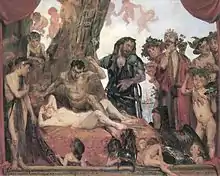Homeric laughter
Homeric laughter is inextinguishable or irrepressible mirth. The term is derived from the ancient Greek ἄσβεστος γέλως, which Homer uses
- once in the Iliad (1.599) and once in the Odyssey (8.326) for what the other Olympic gods engage in with Hephaestus, when he is limping around serving them nectar and when he has caught his wife Aphrodite in bed with Ares;
- once more in the Odyssey (20.346), for an incapacitating hysteria induced in Penelope's suitors by Athena.

Lovis Corinth : The Homeric Laughter, 1909 (Munich, Bavarian State Painting Collections)
The expression came into English from German Homerisches Gelächter.[1]
References
- Hewitt, Joseph William. “Homeric Laughter.” The Classical Journal, vol. 23, no. 6, 1928, pp. 436–47. JSTOR, http://www.jstor.org/stable/3289782. Accessed 3 Oct. 2022.
This article is issued from Wikipedia. The text is licensed under Creative Commons - Attribution - Sharealike. Additional terms may apply for the media files.